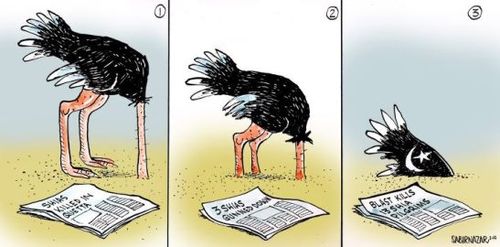They are being sincere, even if they are not being accurate
[ by Charles Cameron — disentangling religion / politics braids in Pakistan and elsewhere ]
.
Blog-friend Omar Ali writes:
The state will make a genuine effort to stop this madness. Shias are still not seen as outsiders by most educated Pakistani Sunnis. When middle class Pakistanis say “this cannot be the work of a Muslim” they are being sincere, even if they are not being accurate.
The “madness” he’s discussing is the extensive killing of Shia Muslims by Sunni Muslims in Pakistan, and I’d recommend both his own article on 3 Quarks Daily and Bahukutumbi Raman‘s on Raman’s strategic analysis as offering detailed background for a topic I addressed from a different angle in Ashura: the Passion of Husayn.
**
It’s Dr. Ali’s final sentence in the quote above that interests me, though, as you’ve probably deduced already from the title of this post:
When middle class Pakistanis say “this cannot be the work of a Muslim” they are being sincere, even if they are not being accurate.
I haven’t quite known how to say this succinctly before, but I think Dr Ali hits a whole array of nails on the head.
Religions are mostly preached to whoever listens — and those who listen can be a pretty diverse lot, particularly across continents and centuries. The upshot is that religions generally wind up being interpreted in a variety of ways to suit the wide variety of human temperaments and situations.
Et voilà! Members of a religion who see it as a force for peace will tend to say of those who dismay them by using it as a cover for violence, “this cannot be the work of a member of my faith” — and they are being sincere, their understanding of their own religion is as peaceable as they say it is.
They are being sincere — even if they are not being accurate, and their religion as a “big tent” across cultures, classes, continents and centuries, also includes sincere people whose views are radically and violently opposed to theirs.
**
If Walt Whitman can say it, you’d better believe it can be said of religions with a billion or more adherents:
Do I contradict myself? Very well, then I contradict myself, I am large, I contain multitudes.




January 13th, 2013 at 3:43 am
The Pakistani deep state funds and protects anti-shia terror groups
http://pakistanblogzine.wordpress.com/2011/10/09/banned-sipah-e-sahaba-lej-rally-near-pakistans-isi-headquarters/
January 13th, 2013 at 7:10 pm
More on the complex complicities of Pakistan:
That paragraph, btw, makes it sound as though “a Tahir-ul-Qadri, Sunni cleric who has arrived” might refer to “a cleric” belonging to a group called “Tahir-ul-Qadri”. Not so. Shaykh-ul-Islam Dr Muhammad Tahir-ul-Qadri is the author of a substantial fatwa against terrorism published by Minhaj-ul-Quran International — MQI being the movement he founded.
.
He’s also of particular interest to me because of his declaration that the Mahdi could not be born less than 744 years from now – which I’ve noted a couple of times here on ZP [1, 2], and which IMO takes some of the heat out from under the Sunni Mahdist pressure cooker.
.
It will be interesting to see what comes of this — would any ZP readers care to comment?
January 14th, 2013 at 2:40 pm
RE: Charles Cameron and MQI
While abroad visiting Pakistan in late 2007 I was lucky enough to meet a scholar from Minhaj-ul-Quran’s university on the train from Karachi to Lahore. Subsequently while in Lahore I visited MQI’s HQ and the university, met with some of Qadri’s deputies and others running MQI – an impressive group of men, some Western educated, focused on the promotion of inter-faith dialog and Islam as a religion of peace. I’d be happy to share more outside of the comments section: newwpe (at) gmail.
January 14th, 2013 at 6:24 pm
Thanks, newwpe:
.
I’ll write you as you suggest, but would also like to invite comments or updates here on the specific impact of the MQI march in light of other trends in Pakistan.
January 14th, 2013 at 8:54 pm
Shamila N. Chaudhary, Who is Tahir-ul Qadri?, on FP’s AfPak Channel today: